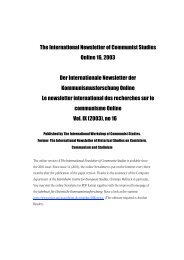VOL. XVI (2010), NO 23 - The International Newsletter of Communist ...
VOL. XVI (2010), NO 23 - The International Newsletter of Communist ...
VOL. XVI (2010), NO 23 - The International Newsletter of Communist ...
Erfolgreiche ePaper selbst erstellen
Machen Sie aus Ihren PDF Publikationen ein blätterbares Flipbook mit unserer einzigartigen Google optimierten e-Paper Software.
<strong>The</strong> <strong>International</strong> <strong>Newsletter</strong> <strong>of</strong> <strong>Communist</strong> Studies Online <strong>XVI</strong> (<strong>2010</strong>), no. <strong>23</strong> 283<br />
by the <strong>of</strong>ficial Soviet press <strong>of</strong> the time as a prime example <strong>of</strong> shameless ‘Western-style’<br />
entertainment, the serial was nevertheless hugely popular, becoming one <strong>of</strong> the most<br />
successful Soviet films <strong>of</strong> the 1920s. Miss Mend is an energetic, fast-moving serial which<br />
opens a window on the phenomenon <strong>of</strong> Soviet Americanism and reveals a little-known side<br />
<strong>of</strong> early Soviet cinema. This new edition was mastered in high definition from superb original<br />
35mm elements produced by David Shepard and Jeffery Masino, with digital restoration and<br />
editing being carried out by Eric Lange <strong>of</strong> Lobster Films, Paris. Featuring a ‘dream cast’ <strong>of</strong><br />
1920s Soviet films stars and special bonus features by film historians Ana Olenina and<br />
Maxim Pozdorovkin.” (http://www.flickeralley.com/fat_missmend_01.html).<br />
DVD: ...nicht der Rede wert? Die Ermordung der Lehrerin Bian Zhonggyun am Beginn<br />
der Kulturrevolution.<br />
In Form einer CD, DVD und eines Begleitheftes wird die Geschichte von Bian Zhongyun<br />
erzählt, Lehrerin und Vizedirektorin am Pekinger Mädchengymnasium, die am 5. August<br />
1966 zu Beginn der Kulturrevolution von ihren eigenen Schülerinnen zu Tode geprügelt<br />
wurde. Dabei handelt es sich beim Pekinger Mädchengymnasium nicht um irgendeine<br />
Schule, sondern um diejenige an der hauptsächlich die Töchter hoher Parteikader<br />
unterrichtet wurden. Dieser erste Mord gilt als Auftakt des „Roten August“. Innerhalb eines<br />
Monats wurden über 1700 „rechte Elemente“ im Namen der Kulturrevolution von<br />
Schüler/innen und Student/innen erschlagen.<br />
Der Dokumentarfilm und die dazugehörige CD erzählen auch die Geschichte der<br />
Hinterbliebenen und ihr Umgang mit den Ereignissen, ihr Einsatz für die strafrechtliche<br />
Verfolgung der Geschehnisse und ihr Bemühen um die Dokumentation und Veröffentlichung.<br />
Informiert wird zudem über den heutigen öffentlichen Umgang mit den Vorgängen während<br />
der Kulturevolution.<br />
...nicht der Rede wert? Die Ermordung der Lehrerin Bian Zhonggyun am Beginn der<br />
Kulturrevolution. Berichte von Wolfgang und Susanne Schwiedrzik und ein Film von Hu Jie.<br />
In Zusammenarbeit mit Deutschlandfunk, Neckargemünd und Wien, Edition Mnemosyne,<br />
Verlag für alte Hüte und neue Medien, 2009.<br />
<strong>The</strong> History Film Festival <strong>of</strong> Pessac: "Once upon a time: Communism ("Il était une<br />
fois : le communisme").<br />
From 9 to 16 November 2009, the <strong>International</strong> Film Festival <strong>of</strong> Pessac took place in a small<br />
town near Bordeaux, dedicated to the history <strong>of</strong> Communism, at the occasion <strong>of</strong> the joint<br />
20th jubilee <strong>of</strong> the festival and the fall <strong>of</strong> the Berlin Wall.<br />
<strong>The</strong> programme contained more than fifty fictional and documentary films, among them<br />
classics like Oktiabr’ by Sergei M. Eizenshtein (1925), Ninotchka by Ernst Lubitsch (1939),<br />
Quand passent les cigognes by Mikhail Kalatozov (1957), L’Aveu by Costa-Gavras (1969),<br />
Otac na službenom putu by Emir Kusturica (1985), but also Good Bye Lenin! by Wolfgang<br />
Becker (2002), La Maison haute by Pavel Lounguine (2003) and Katyn by Andrzej Wajda<br />
(2007). <strong>The</strong> geographical subjects covered were Asia, Cuba, Central Europe and the<br />
Balcans, Eastern Europe, France, Spain and the Soviet Union. As <strong>of</strong>ficial award in the<br />
category „fiction“, the festival honoured Vincere (2009), a film by Marco Bellocchio about the<br />
young (and socialist) Mussolini. <strong>The</strong> student joury award was given to Whisper with the<br />
Wind/Sirta la gal ba (2009) <strong>of</strong> the Iranian director Shahram Alidi and the public award to the<br />
French film Liberté by Tony Gatlif (about the destiny <strong>of</strong> a group <strong>of</strong> Roma in Vichy France). In














